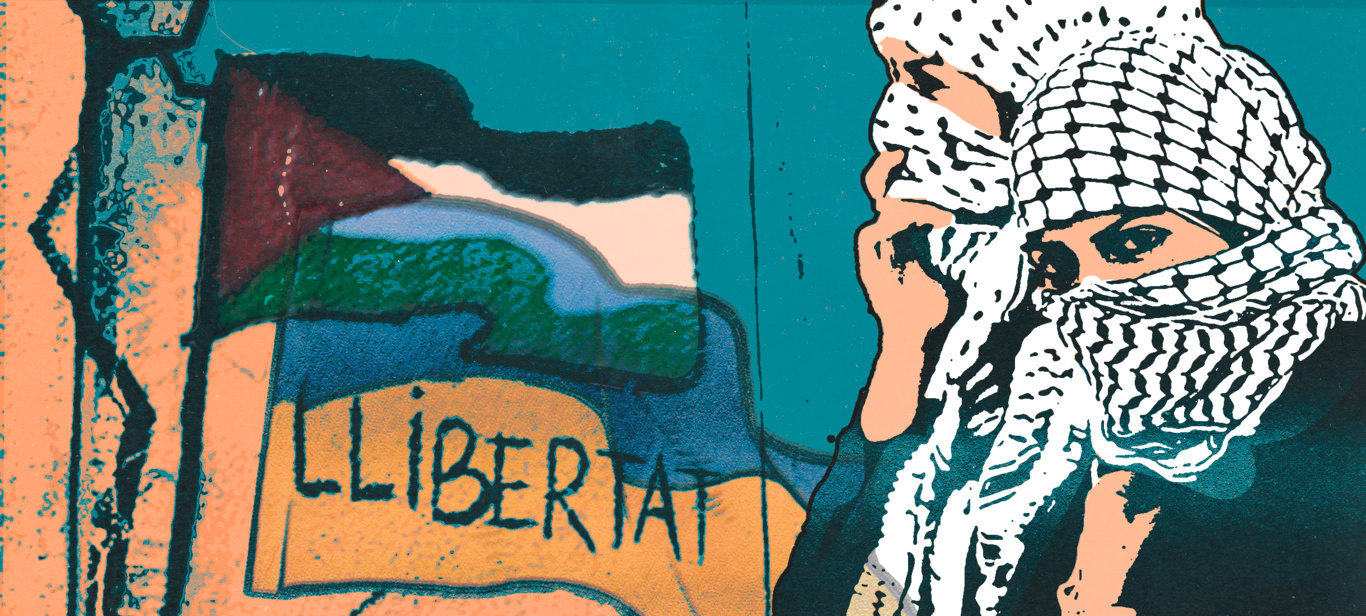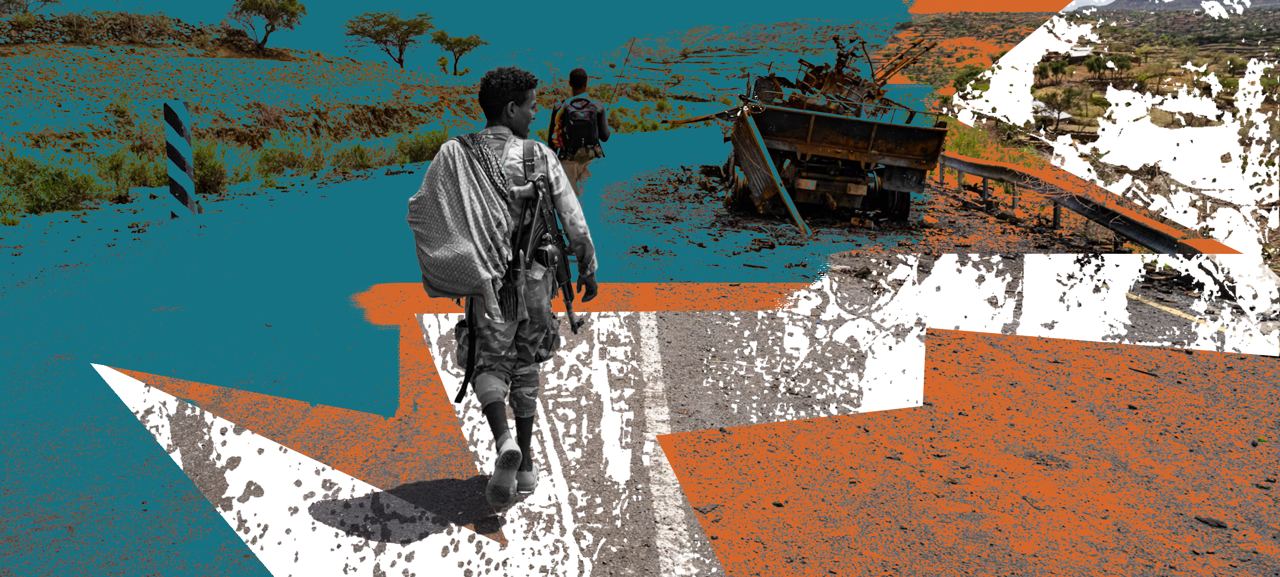Struggle of the people of Palestine for their freedom and independence is probably one of the ‘don’t ask – don’t tell’ topics for many Ukrainians covered under such a generalisation as the ‘Near East’, and is associated with wars in the first place. At the same time Israel is often presented as a role model for Ukraine, both in terms of safety and economically. In order to challenge such stereotypical visions we decided to talk to the Palestinian researcher Dana El Kurd. She is a researcher in political science, and an assistant professor at the University of Richmond. Dana works on state-society relations in the Arab world with topics like authoritarianism and international intervention. Palestine is the focus of her research interest. Dana was born and raised in Jerusalem, and later she immigrated to the United States.
People in Ukraine, unfortunately, don’t know much about Palestine and they tend to perceive the situation through the Israeli lens. Could you describe the current situation of Palestinians in the West Bank and Gaza?
Palestinians in the West Bank and Gaza, which came under direct Israeli occupation after 1967, live in an escalating situation of occupation. This has been an occupation for over 50 years now. But other parts of historic Palestine have been under direct Israeli control for even longer. In the case of the West Bank we can speak about increased colonisation, as the settlements are expanding. There's less freedom of movement, there's less freedom of expression. Because of just the sheer amount of land grabs that are happening, there's less space for Palestinians. And then, obviously, very heavy-handed military repression by the Israeli occupation forces is happening as well. That's the context in the West Bank.
In the Gaza Strip, although there aren't Israeli boots on the ground, they're completely blockaded. And so, by international law, they're still considered occupied in the Gaza Strip, they're blockaded by the air, the sea, and the land. Water crossings are closed. They can only go something like five to seven miles out in the sea, and even there oftentimes fishermen get attacked. And, obviously, the airstrikes are happening – the violence and attacks on Gaza are cyclical. That's the condition for the occupied territories.
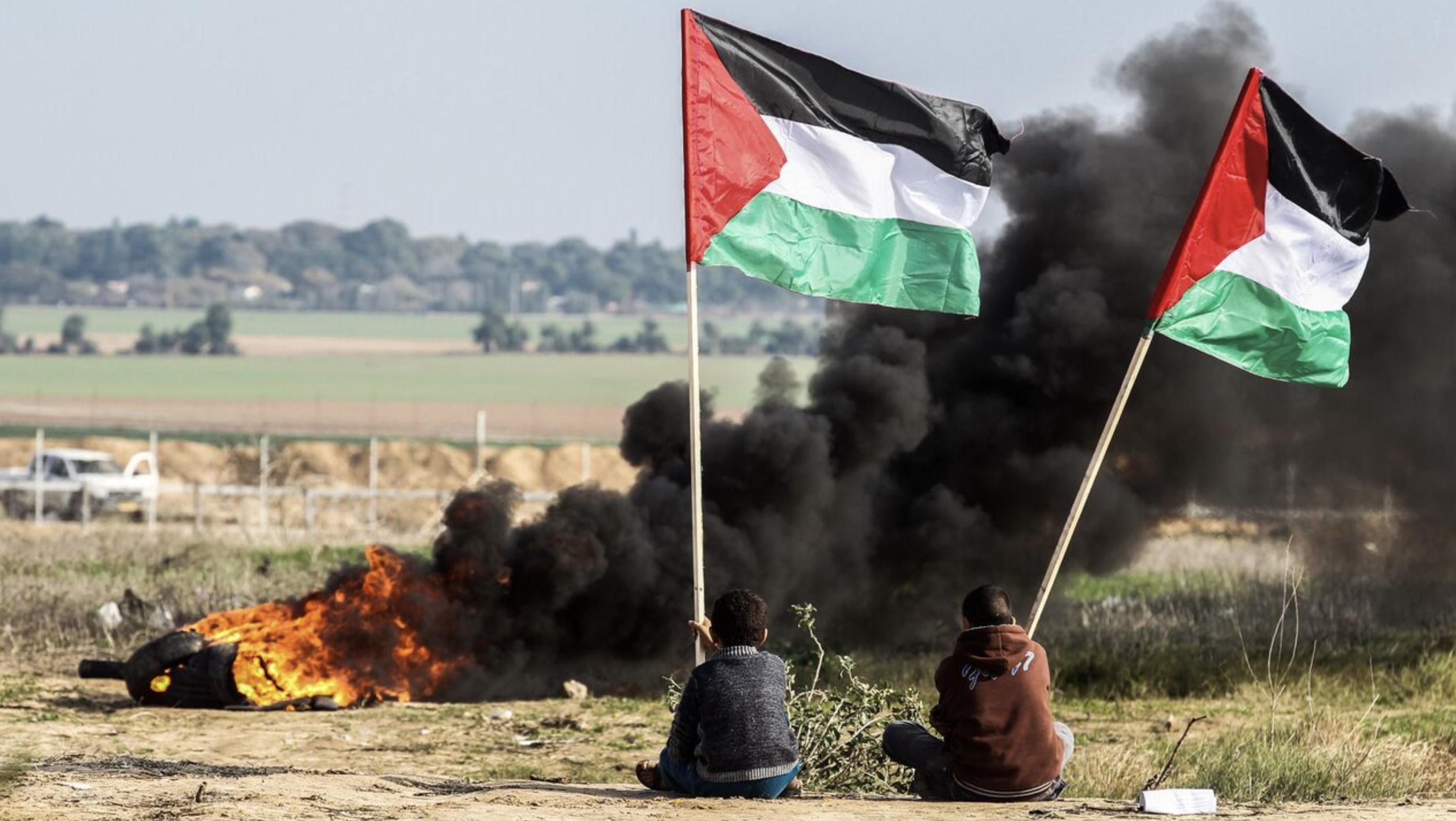
Children with Palestinian flags. Photo: AFP 2023 / Said Khatib
East Jerusalem is also occupied, but slightly different in terms of how people are living. There's tension in East Jerusalem because there's just a lot more interaction between Israeli settlers and Palestinians. At the same time, people in East Jerusalem who have a kind of residency in the city granted by the Israeli government – they do have slightly more freedom of movement across different parts of historic Palestine, compared to people in the West Bank and Gaza. But also they're kind of prisoners because they can't leave without foregoing the residency. So this residency is definitely not permanent which is what happened to my family.
Conditions in Jerusalem are also difficult economically, by design. Palestinian residents are taxed at a very high rate, and receive very little services in return. Their educational and cultural institutions have been attacked, and many have been closed down. This situation has led many Palestinians to try and better their opportunities by seeking education and employment abroad. This is what happened with my father, who pursued graduate school in Japan and then looked for a position in his field. There was nowhere for him to go in his home city to make a living, and so he got a job in the United States. Although we used all of our spare money to try and go back to Jerusalem often, in order to maintain residency, the Israeli government denied renewal and withdrew our residency permits. Can you imagine that? You don’t have a right to the city you were born in, the city your ancestors were born in and lived in for many generations, the minute you step away to better your life. The Israeli state will take any excuse to empty Jerusalem of its Palestinian inhabitants.
In your book you write very critically about the Oslo Accords and the role of the Palestinian Authority accusing them of authoritarianism, polarisation, and demobilisation of Palestinians. Сould you explain the point briefly?
Essentially what I wanted to look at is the role of the international community and the United States in particular, which was the main driver of the conditions that developed after the Oslo Accords. In particular I mean the conditions of polarisation we see in Palestinian society and the demobilisation of Palestinians in terms of large-scale mass movements, unlike the mass protest movements that we used to have in Palestine in the past. And the reason I connect those two things – the international intervention and American influence in particular, and these kinds of outcomes like polarisation and demobilisation – is because the Oslo Accords created a situation where certain political elites and leaders were empowered and insulated from their constituents. The Palestinian leadership, especially after the first president of the Palestinian Authority Yasser Arafat was sidelined, that leadership that emerged does not care to be accountable to the Palestinians. They basically understand from the Americans that if they play the game that the Americans want, they get to keep their positions, and continue being leaders in this strange peace process that never ends and that hasn't achieved any kind of tangible positive changes for the Palestinians.
Just to summarise, in my book I argue that this kind of international intervention in governance leads to a completely insulated and increasingly authoritarian political leadership in the Palestinian territories. This polarises Palestinians because, especially in the aftermath of elections, the Americans encouraged certain political parties to overturn the elections and not support democratic accountability.
All of that has led to a situation where Palestinians have more in-fighting and they're not working together. And then, because of that kind of political division on top of the geographic division that Palestinians deal with, they also can't coordinate together to engage in these protest movements that have worked in the past to challenge Israeli authority.
Fatah, which has managed to co-opt much of the Palestinian left, is corrupt and authoritarian, but the alternative to them, Hamas, are Islamists. What is the way out of this situation?
It's a hard question. We can’t really describe Fatah as leftist in the way you and your readers might understand the term, but they're a secular nationalist movement. And they were the dominant party in the Palestine Liberation Organisation (PLO), which is this umbrella organisation that historically encompassed a lot of different Palestinian political parties. But Fatah was definitely the dominant one. And they are the ones that had, historically, the most social support and legitimacy.
Fatah was the dominant party in the PLO. Then the chairman of the PLO, which came from that party, Yasser Arafat, signed the Oslo Accords. And then the PLO essentially ceased to function. Fatah put all of their effort into the peace process and into creating a Palestinian Authority and this kind of quasi-governance situation. It left the PLO – which did historically achieve gains for the Palestinians – to kind of wither.
Fatah, which dominated and still dominates the Palestinian Authority, is very corrupt and authoritarian. And then the “traditional” Palestinian left – like the Palestinian communists and the Popular Front for the Liberation of Palestine – are tangential in terms of their impact. Their recent positions have been quite campist and tankie. They also don't achieve a lot of social support or legitimacy.
The alternatives, which are outside of the PLO, are Hamas and Islamic Jihad. And they are Islamists, and they're also very authoritarian – both in terms of ideology as well as their governance in the Gaza Strip.
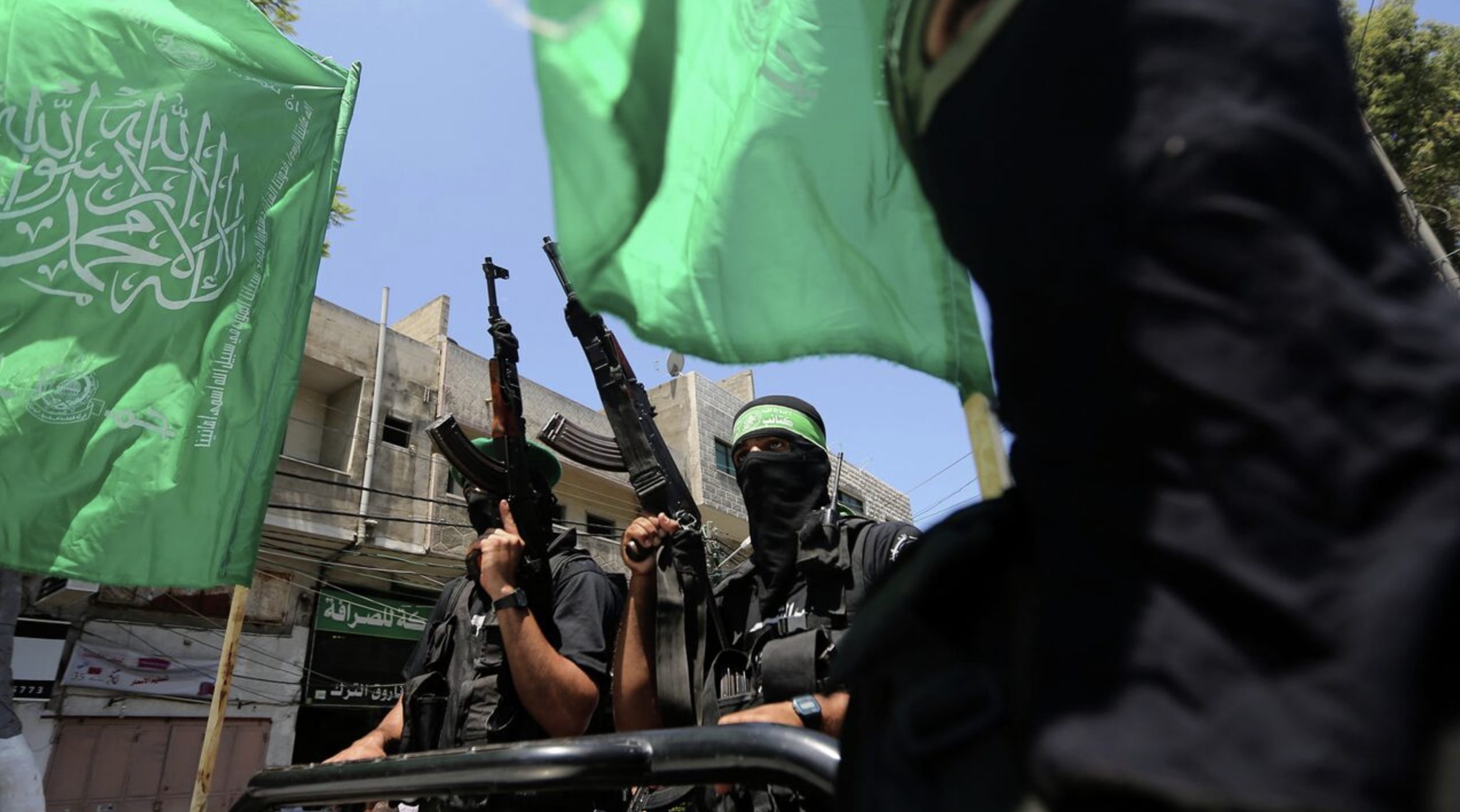
Members of the Hamas movement. Photo: AP / Hatem Moussa
So do I see any way out of the situation? I think most Palestinians are pretty sick of both main camps, they're sick of both poles. And clearly it's led to nothing but division, until we can either reorganise the PLO or bypass the PLO and create different alternatives – different political parties and alternatives around the traditional structures. I don't know any way forward aside from those two options. Palestinians are pretty stuck. And it's not to take away the agency of Palestinians, but this was also largely by design. The impact of international intervention in this case created this level of polarisation we're seeing.
The situation in Palestine has been worsening, the repressions have become more brutal and the opposition is growing from the Palestinian side. Could you tell us more about the reasons and what this can lead to?
There's a couple of reasons I think that we can pinpoint as to why there is increasing Israeli repression, and then also, the kind of backlash effect that we're seeing in terms of radicalization.
One reason goes back to the Oslo Accords. And this is not me saying something conspiratorial: the man who signed the Oslo Accords on the Israeli side, the prime minister at the time, Yitzhak Rabin, stood in front of the Knesset and said something like, ‘We're gonna give them less than a state.’ With the Oslo Accords they were not intending to actually lead to a two-state solution. And that stagnant status quo has continued, with certain changes on the Israeli side. Hence, the first reason that this is happening is because the Oslo Accords have been there since 1994, and nothing has changed. Things have only gotten worse. Palestinians are no closer to having any kind of self-determination or sovereignty. And we have generations of Palestinians who have known nothing but that kind of stagnation. This creates a situation where people have a lot of grievances. The Oslo Accords also created the situation where the Palestinian Authority is insulated from democratic accountability, from changing. And so Palestinians, especially young Palestinians, are like, ‘We don't even have an outlet through our own politics to try to make a change for ourselves.’ So that's one reason why Palestinians are more frustrated.
The second reason is changes on the Israeli side. Israeli politics has become much more right-wing. And Palestinians always get on me for this because they argue that there's no difference between the Israelis, but I do not think so. Years of the Netanyahu government and his corruption, and him empowering very outward extremists here – that has also created a situation where we have people in the Israeli government who are ideologically committed to ramping up their oppression, to finishing the job. They've been discussing ethnic cleansing and things like this. And as a result of the Oslo Accords – that the U.S. has put all its weight behind – we also have a situation where they have complete impunity. Nobody holds them accountable, the US certainly doesn't hold them accountable. Sometimes we hear from the Biden administration, ‘Oh, you know, we're concerned.’ But otherwise nothing happens to the Israeli government.
Those two reasons lead to the situation we have now. And on the Palestinian side, we have a corrupt and stagnant political situation and we have young people who may have watched their elders, trying to engage in nonviolent protest again – and that went nowhere. And so a lot of people have joined these new armed groups that have emerged. They're basically saying, ‘We don't really have an endgame. We have no kind of long-term objective.’ But they're still willing to give their life and essentially go on resisting in an armed way. Despite being completely outnumbered and outgunned. And they know that their death is imminent. But they'd rather do that than try to engage in any kind of other political process because everything else is closed to them.
We do see Israeli repression ramping up and then also the rise of these new armed groups in places like Nablus and Jenin, and some copycats in other places that are new and not affiliated with any political party or political movement that already exists in Palestine. Their members come from different ideological persuasions. You've got a leftist and an Islamist, and all different kinds of people – they're joining these new armed groups that offer them a way to resist, even though they can't really achieve much with that, given the extent of Israeli oppression and surveillance and things like this.
What can this lead to? I think it's going to lead to increasing escalating violence. And then, I would not be surprised if the current government in Israel tried to engage in a kind of mass-scale violence or ethnic cleansing. I think that's not beyond the realm of possibility.
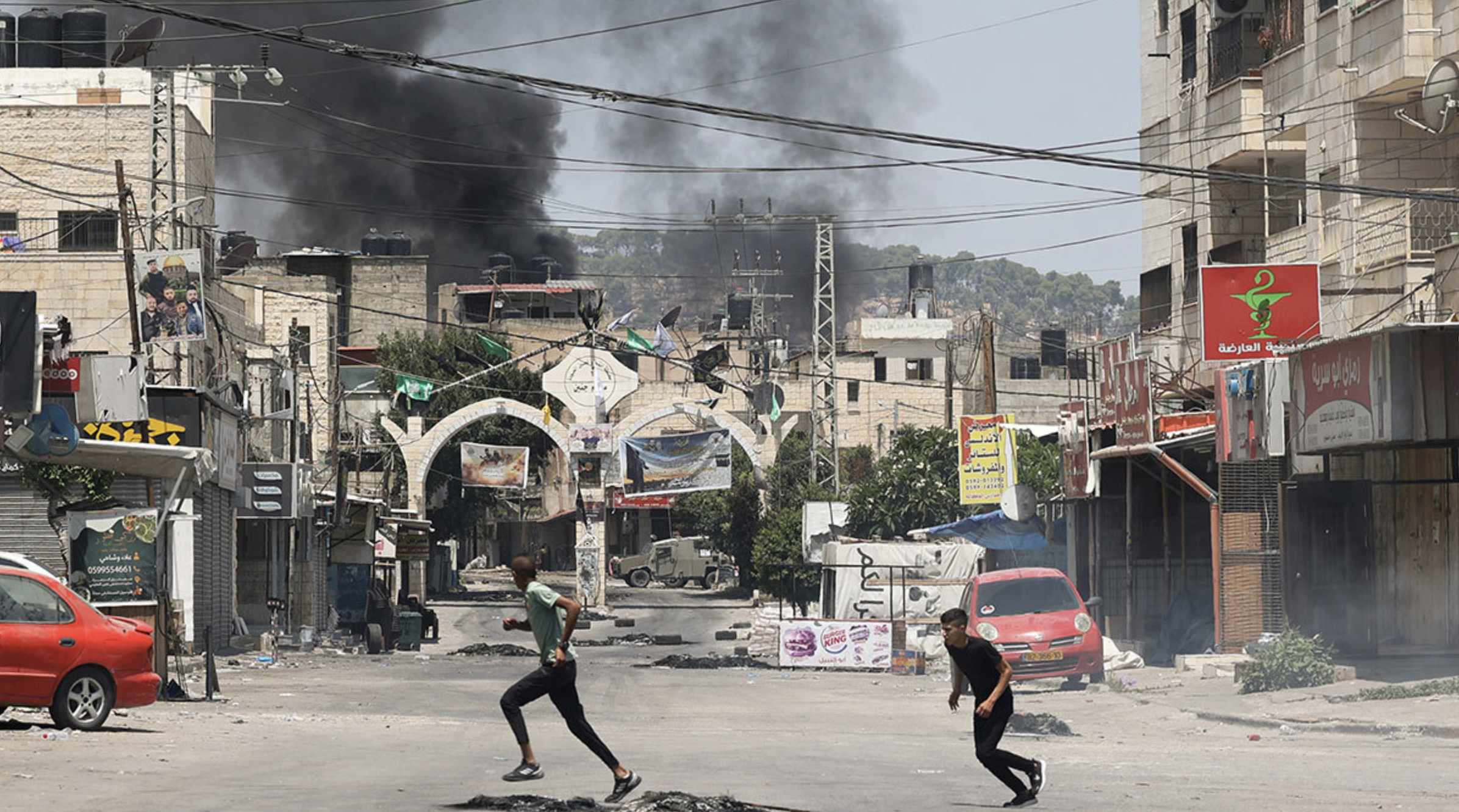
The raid of the Israeli army on the Janine refugee camp. Photo: JAAFAR ASHTIYEH / AFP
You spoke about the new kind of generation of activists. Do you feel optimistic about them?
There are certain things that I'm optimistic about. I am optimistic about the fact that the activists that are engaged in advocacy are more coherent about naming what is happening and not shying away from addressing Israel’s structure rather than just its policies. That's a good development.
I'm also very optimistic about that kind of renewed commitment to the Palestinian identity. Because it's very easy in a society like Palestine, where you have a huge diaspora that's all over the world, for people to lose commitment. But we have these organisations, especially in the Western context, that have regenerated this commitment to a national identity and a national movement. That's very promising.
Some things I'm very concerned about is that I don't think Palestinian activists are fully learning the lessons from the past about infighting, about how to coordinate effectively with each other, about those kinds of things. And I think they're also stuck in how they view the role of Palestine in the world, or how they connect to others in this kind of solidarity. I see Palestine discussed in a kind of “anti-imperialism of idiots” way by a lot of the most active people. I think that's a huge issue in our understanding of this conflict. This is not just an anti-colonial conflict, it's also an anti-authoritarian conflict. The way that people think about Palestine within Palestine activism spaces, is very old-fashioned and stagnant, as if the Cold War never ended. That is what I'm worried about, besides the infighting.
In a book chapter, published around five years ago, you argued that the protests in Palestine were mostly working class while the middle class was passive or trying to achieve something within the institutional framework. Has anything changed since then? And does class really play a role here or is it more important whether people live under direct occupation or under the rule of the Palestinian Authority?
I think some things have changed. My first answer would be – I think class is still super important. Сlass is kind of a neglected factor when we discuss who's getting involved, particularly in armed strategies. There is very clearly a class dimension. We don't see many people of the middle or upper middle class engaging in armed strategies. Armed resistance is coming from Jenin refugee camp. It's coming from the old city of Nablus, a very underprivileged area. These are the communities that are fueling the armed resistance. Class is still very much a factor.
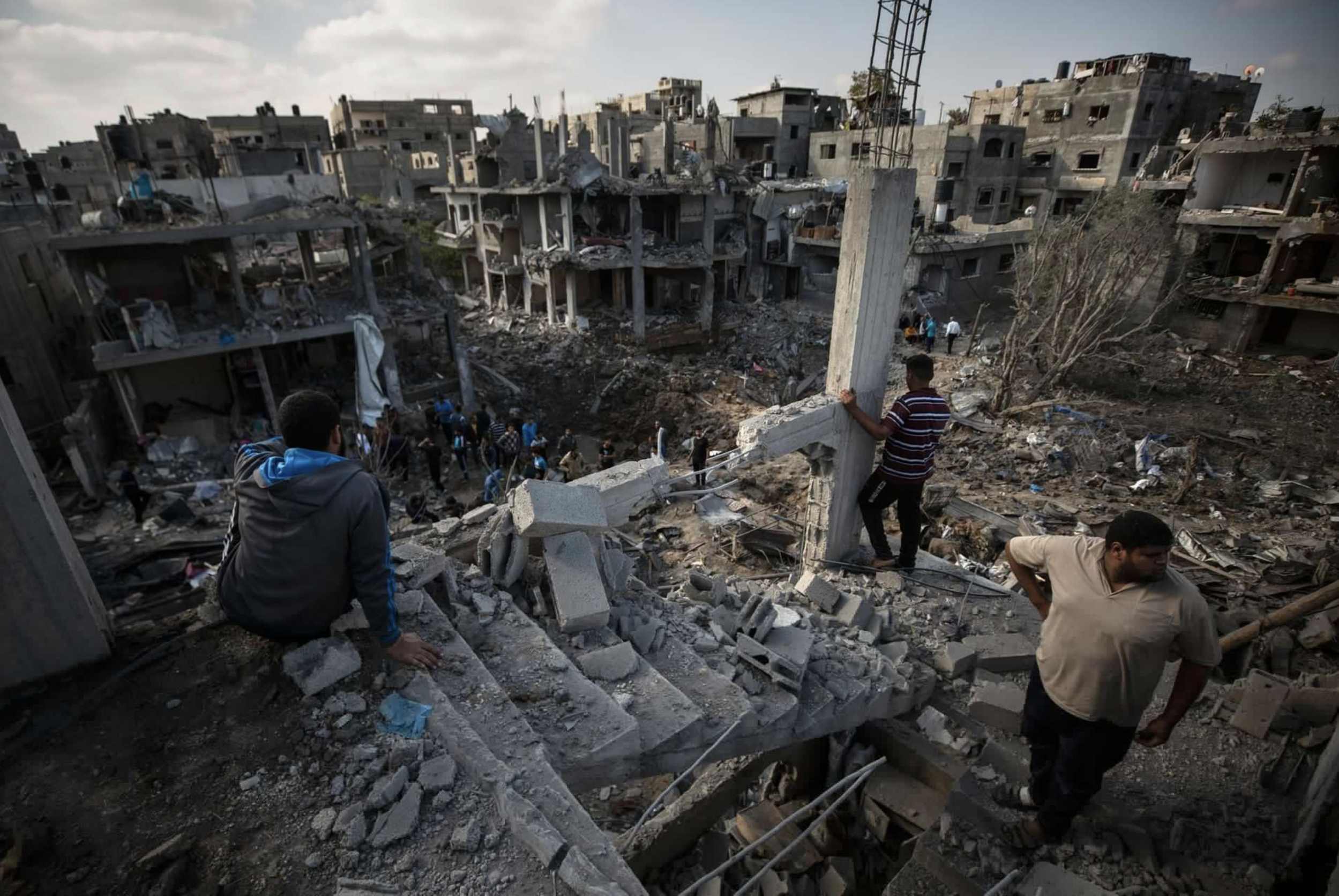
Palestinians inspect their destroyed homes after overnight Israeli airstrikes in the town of Beit Hanoun, northern Gaza Strip, on May 14, 2021. Photo: AP / Khalil Hamra
But I wrote that paper before the Palestinian Authority lost its entire legitimacy in the last couple of years. At the time that I was writing and based on the data that I was collecting, people who were protesting were mostly in these rural villages, mostly farmers and working class people. Now, given the severity of the situation for lots of different kinds of people, I do think there is more middle class involvement in protest. And then, particularly in Jerusalem and in Palestinian communities within Israel, the people who are leaders of protest activity and organisations are definitely middle-class. But yes, for those who are living under direct occupation or at those kinds of friction points, the class dimension may be less relevant.
For a long time, the people who are living under more direct Palestinian Authority control had that factor that demobilised them to a larger degree because of the Palestinian authorities' involvement in civil society. But these people are still under occupation and living through the Israelis’ raids. So in the last few years, especially with what we call the Unity Intifada in 2021, we do see more participation across classes. And that is cool. Though armed involvement still has a very clear class dimension.
Edward Said, one of the most prominent Palestinian Christians, was an important promoter of the Palestine cause in the West. And how are these things now? Are Palestinian Christians participating in the struggle against the apartheid?
Research shows that Palestinian Christians have been more heavily emptied out of historic Palestine. Their numbers have dwindled to a larger degree than the Muslim population for a variety of reasons. That includes the fact that they were more affluent in some places, and so they had the resources to immigrate. They also had connections to Palestinian communities in the diaspora more than other Palestinians. So we see more of them in the diaspora than we see on the ground. In both cases, in the diaspora and in historic Palestine, Christians are an important part of the national movement. They are impacted by the Israeli state, and victimised, in many of the same ways. The Israeli occupation does not distinguish between a church or a mosque, or restrictions on Bethlehem versus Ramallah. And especially in the diaspora, you see a lot of people from a Palestinian Christian background who are active.
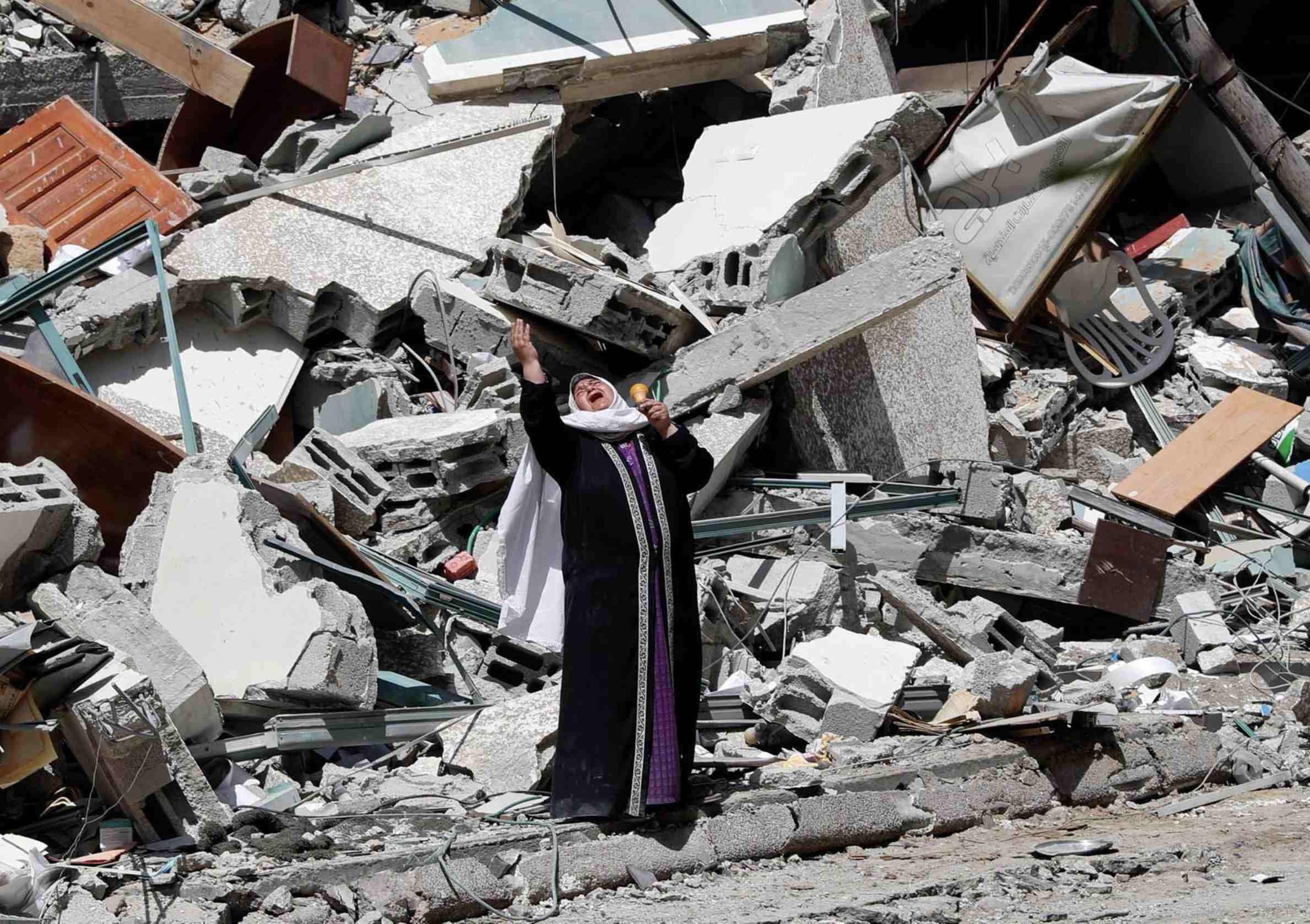
A woman cries near the ruins of the Al-Jala building destroyed by an Israeli airstrike on May 16, 2021. Photo: AP / Adel Hana
Historically speaking, a lot of people who articulated Arab nationalism (and Palestinian nationalism in particular as a form of Arab nationalism) are Christian. For example, one person who used to be in the Israeli Knesset before he was exiled, is Azmi Bishara, and he is a Palestinian Christian. And lots of the people who are involved in the political party he set up which still continues today are of the Christian faith. If you had asked me 10 or 15 years ago, I would have said I've never seen anybody in Palestinian society making a distinction in terms of their role. The oppression is just too severe to sit there and make that distinction, really. But unfortunately a recent study has shown that Christian communities in Palestine are feeling even more squeezed than before, not just by Jewish extremists but also by increasing religious extremism among Palestinian Muslims. It is a really sad state of affairs, given the integral role of Palestinian Christians in the national movement.
Israel extensively uses its image as the only democracy in the Middle East, and its tolerance of the LGBTIQ+ community. What can Palestinians oppose? What is the situation in Palestine with attitudes to LGBTIQ+ rights and feminism, and so on?
I'm so confused that people fall for this kind of propaganda point. Because democracies also commit crimes and engage in authoritarian practices. Democracies can be settler-colonial states. I think that Israel is a very imperfect democracy, even for its own citizens. A huge chunk of its population are second-class citizens, and they have all sorts of problems internally as well, even within Israeli society. But even if you were to take it at their word, that they are a democracy – democracies commit crimes. For instance, the US invaded Iraq. The word democracy does not entail a positive connotation always and all the time.
Israel has a long history of using LGBTIQ+ acceptance and more freedom of expression for people in Israel as a point to say like, ‘We're more aligned with the West and these Palestinians are barbaric’. And that's called pinkwashing. But that being said, the current government they have is definitely anti-queer. So that doesn't even hold true anymore.
What Palestinians can do to oppose this is to move away from a discussion or an argument about liberal notions of rights and discuss the structure of the state. The state is a settler-colonial state. I don't care how many rights it gives internally. It's engaged in settlement and occupation. So it's really kind of an irrelevant point.
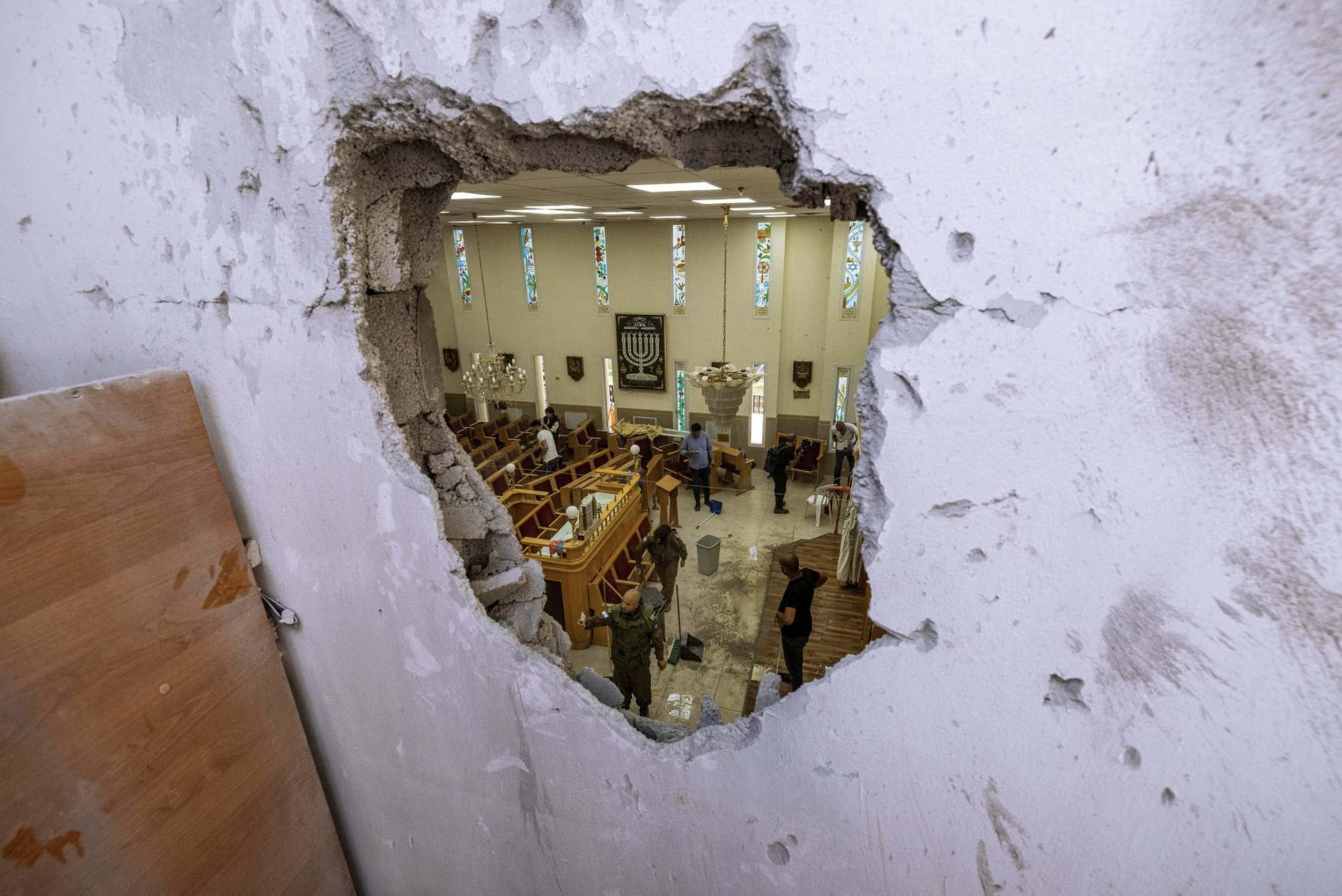
A hole in the wall of a synagogue damaged after it was hit by a rocket fired from the Gaza Strip, in Ashkelon, Israel, on May 16, 2021. Photo: AP / Tsafrir Abayov
What are the attitudes to LGBTIQ+ people and feminism, and things like that, inside Palestine? We have new movements that have emerged in the last couple of years. There's a feminist movement called Tal'at and other feminist movements engaged in protests and other activities. And we have a Palestinian LGBTIQ+ organisation that has been very active, if small. But I will say that for Palestinians, this is a point of contention internally. There's a large segment of society that sees it as some sort of distraction, some sort of Western-imposed division. There is discrimination against those kinds of identities, which is obviously a problem. Where it becomes really, really a problem is, for example, in a case that emerged in the Palestinian community last year between Palestinian activists. We had a very prominent Palestinian news organisation, called Metras, that put out a really terrible letter saying that we shouldn't even be discussing LGBTIQ+ issues and these are distractions. Then, there was a backlash, and other Palestinian activists said, ‘No, they're part of the society, and isolating queer people is not a path to liberation.’ There's a lot of tension around the issue, and by no means am I claiming that Palestinian society at large is very pro-LGBTIQ+ or pro-feminism. That is still a battle that Palestinians wage internally as well.
My next question is going to be about pro-Palestinian activism in Arab countries. Earlier, you positively assessed the role of pro-Palestinian activism in Arab countries, calling it a school of activism for democratic activists. But, on the other hand, from the outside such activism can look like conformism – focusing on a safe topic and avoiding direct criticism of authoritarianism at home. And until recently, Arab regimes had instrumentalised the Palestinian cause for the nationalist consolidation of their societies. What is your opinion on that?
Today, pro-Palestine activism is much more targeted and no longer a safe topic. But yes, in the past, it was one of these safe topics that the states thought that they could instrumentalise and allow. We have a concept, a word in Arabic, tanfees, which literally means letting out hot air. It's a concept we use to describe how authoritarian governments in our region might sometimes allow people to have a pro-Palestine protest, in this case, to let off some steam, so that people don't threaten them or their rule directly. My argument in that paper was to show that the regimes thought it was a safe topic, but this kind of engagement was teaching activists the nuts and bolts of activism, getting them thinking about politics, and getting them to understand organising, and then relating their grievances about Palestine to themselves. Why do they live in a country that doesn't reflect their ideas about Palestine? Why is their foreign policy not so pro-Palestinian? All of those things.
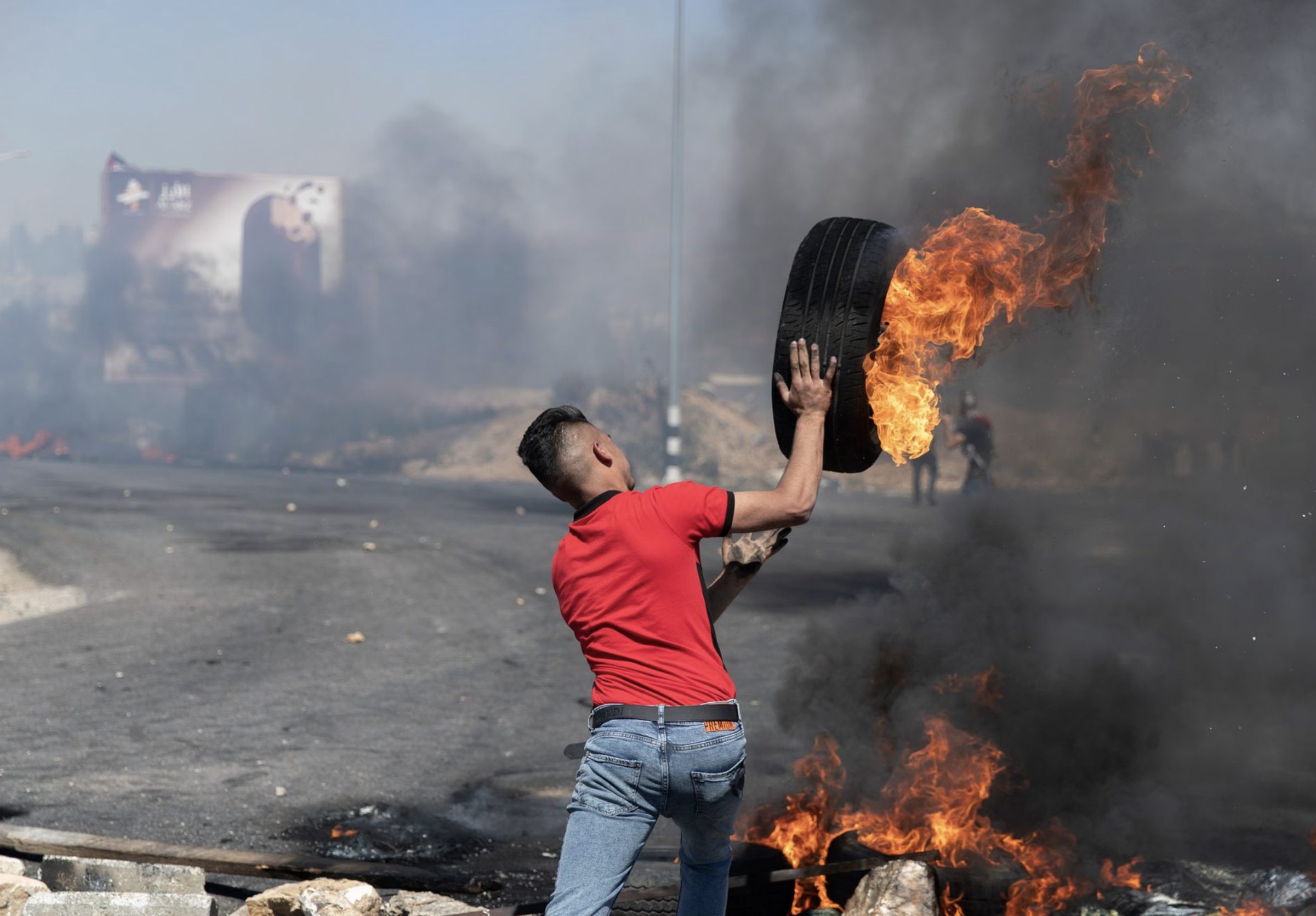
A Palestinian protester throws a burning tire towards Israeli army soldiers during clashes in the West Bank city of Ramallah on May 14, 2021. Photo: AP / Nasser Nasser
My whole argument in that paper was to say that regimes thought pro-Palestine activism was safe but actually, it was not the safest option for the regimes. A lot of the people, who ended up engaging in the Egyptian uprising that took out the president in the Arab Spring, started with pro-Palestine activism and were radicalised through that. We see that kind of repeated pattern in other places as well. Today, I would argue, it's even more radicalising, because it is no longer a safe topic. You can't engage in pro-Palestine sentiment in a lot of countries whereas maybe you could in the past. Regimes have definitely caught on, like ‘We can't actually allow them to let off any steam. People are using this to project it more broadly about their grievances.’
What has changed with the World Cup in Qatar and the support of Palestine by Arab fans and football players? What do you think about criticism for hypocrisy, particularly of Moroccan football players, in view of the occupation of Western Sahara?
The last poll that was released by the Palestinian Center for Policy and Survey Research in December 2022 found that there was a sizable shift within Palestinian society. This is polling within Palestine about how Palestinians trust the Arab world more now. During the World Cup, all of the displays of pro-Palestine sentiment, made Palestinians rejuvenate their trust in the rest of the Arab world and the rest of the region after years of feeling disappointment. That was a direct result of the World Cup and all of those displays.
I think why we saw a lot of what was happening in the World Cup is because it comes after sustained effort on the part of the Americans to push for normalisation between Arab governments and Israel, and the readiness of certain Arab governments to engage in that normalisation, even though it's not a very popular position. I think in the last Arab Opinion Index poll, 88% of people polled across the region refused this kind of normalisation of the state of Israel. So I think what you saw in the World Cup was the Arab public's reaction to these last couple of years of having normalisation pushed down their throat, being told that if you don't support Israel, you're intolerant and you're against peace. But it's not a peace – it's an oppressive policy that is ‘peace’ by name only.
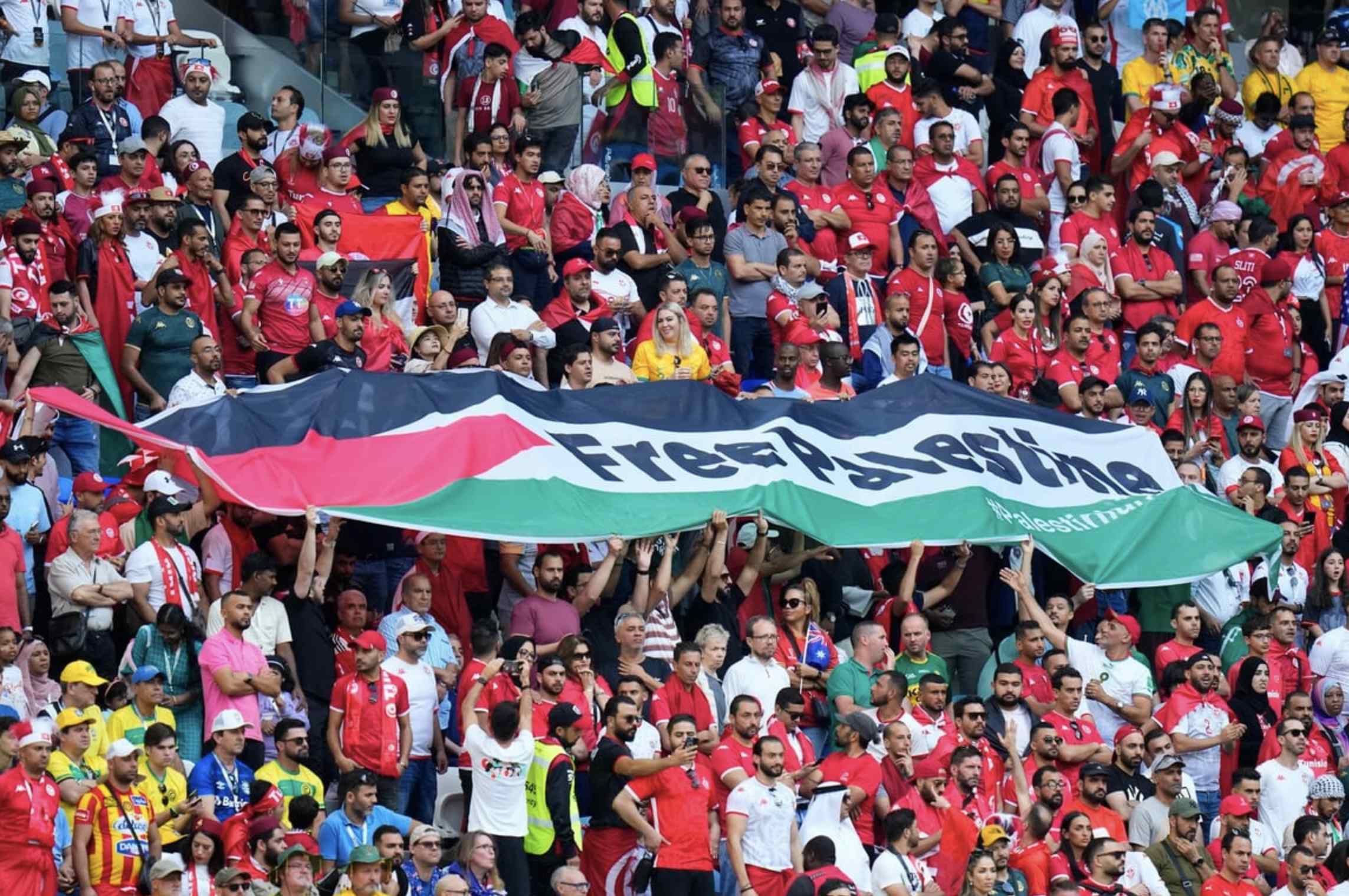
Flags in support of Palestine at the 2022 FIFA World Cup. Photo: from open sources
It’s not a 100% analogy, but it's like the people who say that the Ukrainians should negotiate. Negotiate about what? The Russians need to leave the land they occupied. That's where the negotiation begins. Not like ‘we're gonna give up some of this land’ and call it peace. I think that's how people view normalisation with Israel, when Israel operates the way it’s operating: it's an oppressive peace, it's something that they don't want. And Qatar, who hosted the World Cup, is a state that hasn't jumped on that kind of normalisation bandwagon fully. It has done it in small ways to be sure. And to be clear, it has used normalisation to push its own agenda, and at times instrumentalised pro Palestine activism. But nevertheless, there is more space in Qatar for this kind of activity. The events at the World Cup allowed Arabs across the region to see that ‘it’s not just me – lots of people care about Palestine.’ And then it allowed Palestinians to see, ‘Oh, we're not really forgotten by the Arabs. People care.’ That's been a very direct result of the World Cup.
In terms of hypocrisy – I think that the Arab world finds it easy to be pro-Palestinian at a societal level, but they don't interrogate why it's not easy to be pro-Syrian revolution, or to be against the occupation of Western Sahara. That's where that kind of sentiment isn't enough. We have to connect the Palestine issue to a larger struggle against authoritarianism, which also includes things like the occupation of Western Sahara. That being said, I don't think it's the fault of the Moroccan football players (who raised Palestine flags and were criticised for silence about Western Sahara). They don't make policy – it's an authoritarian state. So I kind of felt bad for the Moroccan team because people were giving them a responsibility that has very little to do with them. They can't freely fly the Western Sahara flag. They'd get in trouble. But needless to say, it just speaks to this kind of larger trend in Arab politics that has been very campist. And for that reason, some people find it easy to express pro-Palestine sentiment, but Syria is too complicated, Western Sahara is too complicated, and so on.
How do you assess the prospects of the Boycott, Divestment, Sanctions movement, the movement which tries to weaken Israel's position through economic pressure?
In the United States, there's a lot of anti-BDS legislation and a lot of attempts to criminalise the “Boycott, divestment and sanction” movement. BDS should be seen not as an end. That's where people get stuck, they think that BDS is the end goal. But BDS is just one tool. Maybe it has been successful in raising awareness, but less so in terms of changing state policy or getting lots of boycotts. And BDS activists have also been heavily criminalised, so they're facing pressures.
We need to think broader than BDS if we want to challenge the Israeli occupation and the Israeli state and its continued trajectory. Some people want to pursue BDS as their kind of strategy, but that's not the only strategy and that shouldn't be the only one we focus on. BDS itself is quite limited. The demands that BDS wants are also very much within the liberal human rights framework. They don’t directly address the structural underpinnings of the Israeli state. You have to keep that in mind when assessing whether to engage in a certain strategy, thinking about the benefits and drawbacks. It's the same argument that I sometimes get from people who think that Palestinians shouldn't engage in any kind of electoral politics: ‘Who cares about voting in Congress’ or whatever. But they're different tools and we shouldn't think of one strategy as the be-all and end-all.
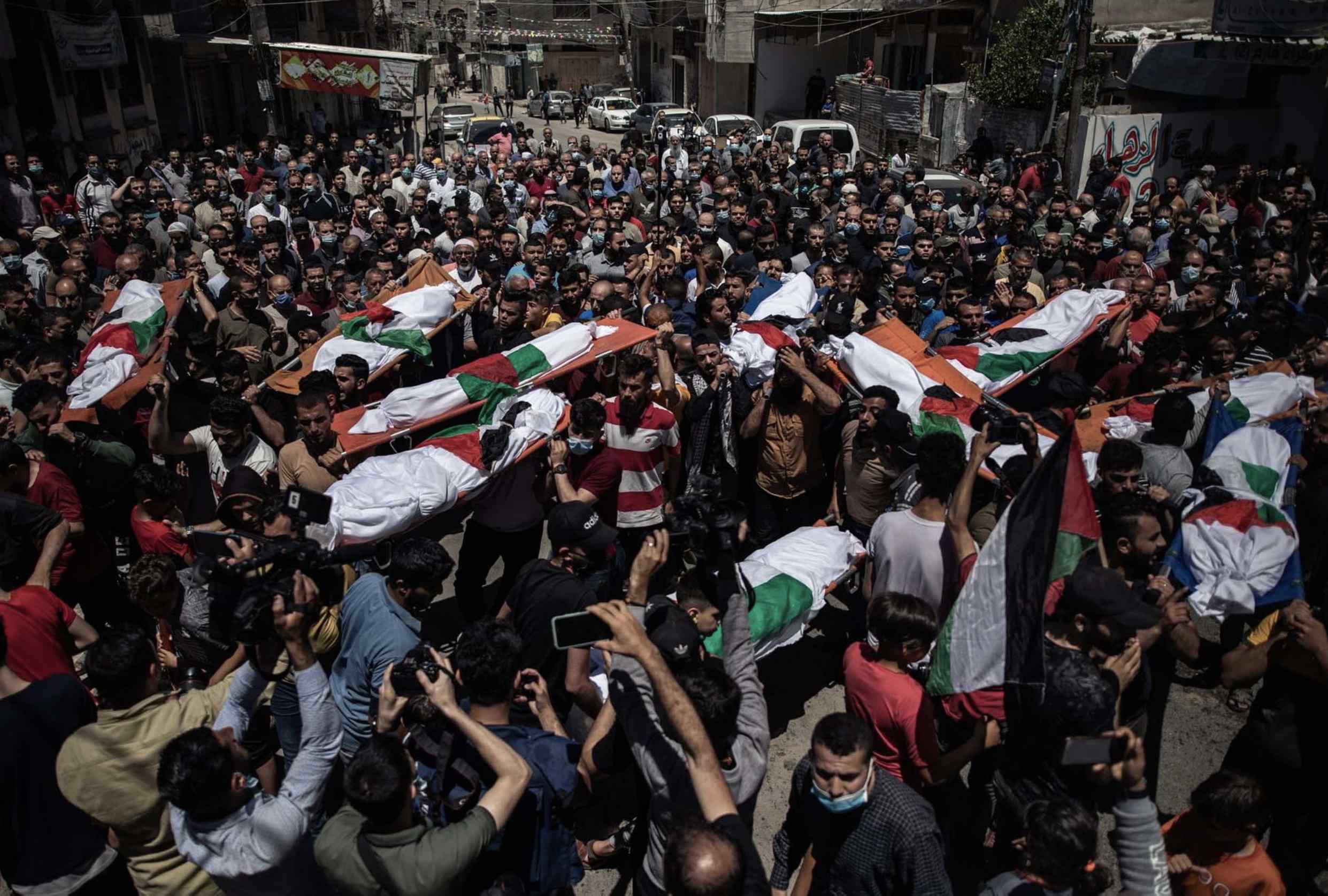
Palestinians attend the funeral of two women and eight children of the Abu Khatab family in Gaza City, who were killed by an Israeli airstrike, on May 15, 2021. Photo: AP / Khalil Hamra
Let's talk a bit about the Russo-Ukrainian war. Has this war changed the perception of Russia in Palestine? Have the attitudes to Russian participation in the war in Syria changed?
Polling from the Palestinian Center for Policy and Survey Research, back from 2014, found that Palestinians largely supported the Syrian revolution at that time. I think a lot of people in Palestinian society saw a lot of what was happening in Syria as very heartbreaking. They sympathised and were against that kind of intervention. That being said, with Russia's invasion of Ukraine there was a poll in June 2022, where 42% of Palestinians blamed Russia for the war, and 35% blamed Ukraine.
For me, that's a very strange divide – I don't understand how anyone could blame the party that's being occupied. But it's because the Palestinians are not an island – they're consuming a lot of the disinformation about NATO, about Russia being forced into war, that everyone else is consuming. We see this in the United States, too. That explains why people are confused or maybe why there's some ambivalence. And I think at the beginning of the war, a lot of Palestinians reacted to what they saw as hypocrisy on the European side. European officials would talk about how Ukraine has a right to resist but not say the same thing about Palestinians. And I think some people don't necessarily care or don't think that they should support Ukraine because, ‘Oh, it's just a hypocritical situation. Look at how they treat Ukrainian refugees and look at how they treated Syrian refugees.’ Unfortunately that thought process exists.
And then on the part of leftists, unfortunately, that's been a complete disaster. Especially leftists in the Western world, like the Palestinian diaspora that's involved with the Western left. I can't even find the words for it, it just enrages me because they just believe Russian disinformation and think that Ukraine is only some battlefront for American imperialism, and other garbage opinions like that. Unfortunately, that does exist amongst the Palestinian left specifically and then broadly speaking, the left in the world. I think people, not leftists but people in general, maybe are reacting to these different narratives and are confused.
In the end, I would like to go back to your very first question – that in Ukraine people tend to perceive things through the Israeli lens. There are historical connections between Ukraine and Jewish communities. Lots of Israelis are descendents of Holocaust survivors, many from Ukraine. Obviously that creates kind of an emotional attachment. But I also think people don't understand the Israeli project, the Israeli national project, as not just of self determination for Jewish people and refuge for them, but also at the same time being one of settler-colonialism and erasure for Palestinians. Looking at the region, they think ‘There's so many Arabs! And there's only this little piece for Israel, so why are the Arabs so up in arms?’ But it's important for Ukrainian readership to understand that Palestinians are indeed Arab by ethnicity, but they are their own separate nationality. A solution cannot be that Arab Palestinians just go somewhere else in this vast region or something. They're tied to this particular place, like Ukrainians are tied to theirs.
I understand it's really difficult, even before Ukraine was invaded. I'm sure people have their own issues and Palestine is so far away. But I really hope that by talking to each other and sharing our experiences, we can think about the ways that we're connected and try to build those kinds of solidarities between societies – because we have common enemies. Authoritarian forces that want to choke democracy, end free peoples, reconstruct societies and erase indigeneity and diversity – they are all aligned. So those of us who resist these forces should be aligned too.
Interviewed by Olenka Gu, Taras Bilous
Cover: Kateryna Gritseva
